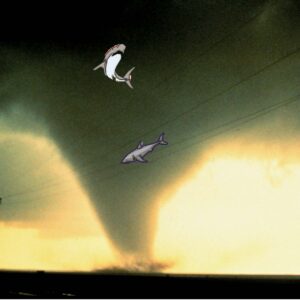 One recent Friday morning, a Sharknado warning at 5:30 a.m. sent me flying from the bed, my heart racing a million miles an hour.
One recent Friday morning, a Sharknado warning at 5:30 a.m. sent me flying from the bed, my heart racing a million miles an hour.
“Get up now. There’s a Sharknado coming. Stay away from the windows and stick with me if you want to live. This is not my first time.”
Yes, I know. Reading it sounds tame, but to get the full effect, please listen to the alarm by Tara Reid. (After demonstrating how to set the alarm, the instructor plays it.) And turn it up loud.
The worst part was, that I was at my daughter’s house, she was not home, and the alarm was coming from her bedroom, the volume so piercing that it woke me despite the noise-canceling CPAP machine buzzing next to me.
What the ….?
WHAT IN THE BILLY BLUE BLAZES IS A SHARKNADO?
You probably are thinking, by now, “Marie lives in la-la land.” I can just imagine you muttering under your breath, “You don’t know what a Sharknado is?…. Do you live under a rock somewhere?”
If you are one of the few uninformed, let me explain. According to Wikipedia:
Sharknado is a series of six American made-for-television science fiction action comedy horror disaster films released by Syfy between 2013 and 2018. It has since been expanded into video games and comics, including a spin-off film, Sharknado: Heart of Sharkness, that was released in 2015. The first two films received mixed to positive reviews from critics, while the others received negative reviews. The series stars Ian Ziering as Fin Shepard and Tara Reid as April Wexler—a husband and wife who encounter “sharknadoes”, tornadoes filled with sharks, wherever they go.
Who knew? I found the first film on YouTube and started to watch, but after twenty minutes in, couldn’t manage it anymore. I did not see the comedy of sharks dropping from the sky and eating people.
WHY ARE THE SHARKNADO AND OTHER ALARMS BAD FOR YOU?
According to Lily Ramsey, LLM, waking to an alarm affects our bodies. Sudden sounds cause:
- Higher blood pressure,
- Higher heart rate, and
- Elevated stress rates triggered by an adrenaline rush.
(OK. I can totally verify this. The ability to get back to sleep vanished after the warning.)
Furthermore, a study cited in the American Medical Association Journal, found that waking from a deep sleep can affect your cognitive abilities, short-term memory, and counting skills. While these symptoms subside after two hours, the long-term effects include chronic mental and physical illness.
Interestingly enough, the type of sound makes a difference. Loud ones trigger our body’s fight-or-flight response. Mild, low sounds do not have the same effect.
However, if you sleep through it, you may develop alarm anxiety—the fear of clock failure. (Wow! I’m learning lots today.) Rather than trust the alarm will go off, we wake up, tossing and turning, before the scheduled buzzer, and glance repeatedly at our clock. Now the unpleasant tone is set for the rest of your day.
No wonder some people set more than one alarm.
DEALING WITH THE SHARKNADO ALARM
The next day I smugly told my daughter’s Alexa smart display to cancel all alarms. And, sure enough, we were not bothered for the rest of the weekend.
Sigh…. I wish this were the end of the story, but it’s not. My daughter set the alarm by punching the screen and, guess what? She’s back! During my next visit, I will force her to put the Alexa app on the phone so she can properly set the alarm. At my age, being scared to death is not funny!
Sign up on www.mariewatts.com to receive future Stories About Life delivered to your email address or read more stories by clicking here.

Recent Comments